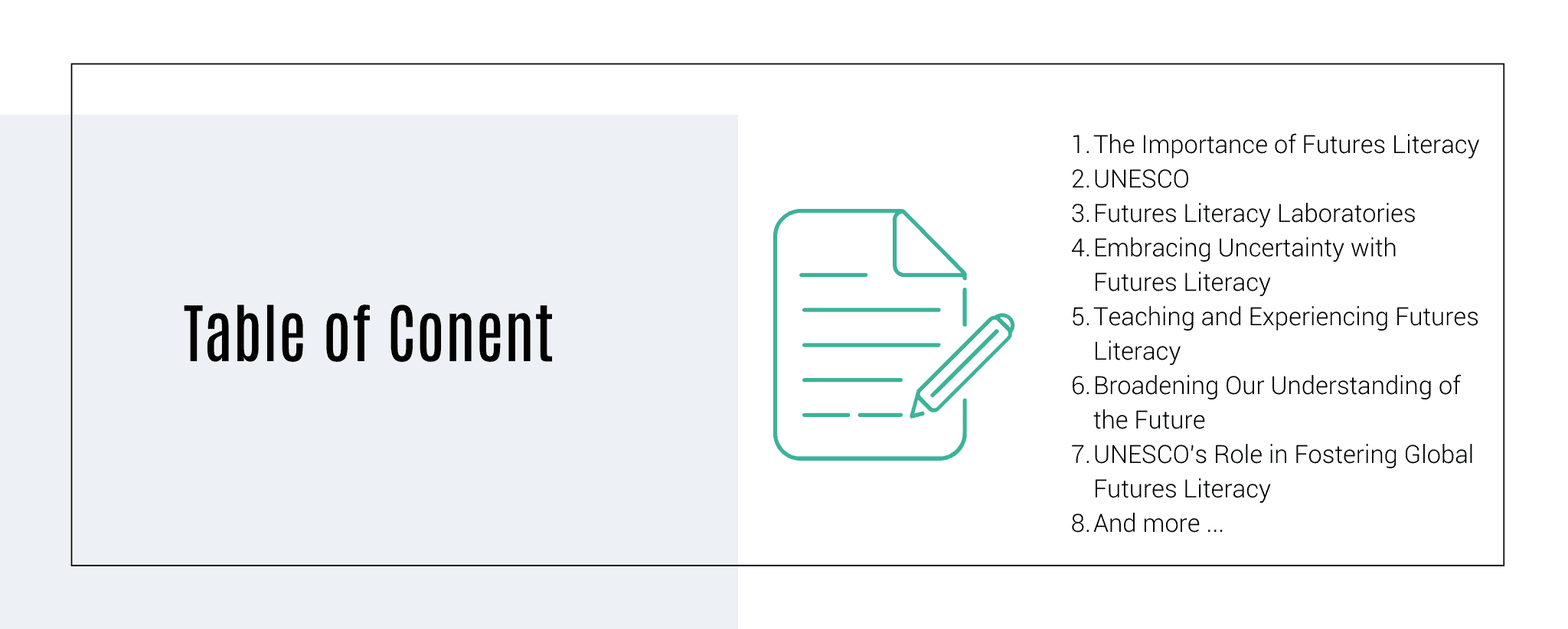The Importance of Futures Literacy
If you think about uncertainties like climate change, pandemics, or social exclusion, it might seem overwhelming, right? This is where Futures Literacy makes a huge difference. This skill allows us to envision multiple possible futures, enabling us to adapt and innovate to confront these challenges. Instead of fearing the unknown, we learn to leverage it as a resource.
UNESCO: The Global Laboratory of Futures Literacy
You’re not alone in this journey towards understanding the future. UNESCO, the United Nations Educational, Scientific and Cultural Organization, has been promoting Futures Literacy worldwide. They work tirelessly to help individuals and communities understand the future better. After all, imagining possible futures isn’t a solitary exercise but a collective endeavour.
Futures Literacy Laboratories: Turning Theory into Practice
Understanding Futures Literacy is one thing, but how do we put it into practice? Enter the Futures Literacy Laboratories, an initiative started by UNESCO. These laboratories use action-learning and collective intelligence to delve deeper into our understanding of the future. For example, the Imagining Africa’s Futures project is a shining example of this concept in action. This project proves that Futures Literacy can be successfully implemented and can make a significant difference in our perception of the future.
Embracing Uncertainty with Futures Literacy
Now, let’s get personal. Have you ever felt anxious about the uncertainties in your life? I’m sure we all have. At the Hanzehogeschool Groningen, they have an innovative education program in Futures Literacy that helps us address these feelings of anxiety. Through workshops, participants envision potential futures, challenge their assumptions, and learn to recognize their own biases. Instead of obsessing over prediction and control, the focus is shifted to flexibility and adaptability.
Teaching and Experiencing Futures Literacy
Futures Literacy isn’t just a concept that you learn; it’s something that must be experienced to be fully grasped. As a tool, it improves our decision-making, enables us to be adaptable, and fosters an appreciation of diversity. Futures Literacy encourages us to move from unconscious anticipation of the future to a conscious and reflective state.
Broadening Our Understanding of the Future
Historically, our understanding of the future has been confined to our current paradigms, often driven by a desire to control and predict. But this approach is limited. Futures Literacy, on the other hand, broadens our understanding of the future, incorporating elements of planning and improvisation.
UNESCO’s Role in Fostering Global Futures Literacy
UNESCO isn’t just promoting Futures Literacy; they’re actively fostering it globally, co-creating Futures Literacy with actors in over 20 countries. They are playing a pivotal role in expanding this capability, focusing on critical areas such as higher education, inclusivity and diversity, refugee situations, decolonization, and policymaking.
The Impact of Futures Literacy on Policymaking
Futures Literacy isn’t just about our personal understanding of the future; it has profound implications for our collective future too. It’s an essential tool for sustainable planning and policy-making, guiding transition processes in society and businesses. Futures Literacy helps us to shape a future that is inclusive and equitable.
Developing a Futures-Thinking Mindset
In our era of disruptive technologies and globalization, leaders in business and community spheres are encountering existential challenges. To tackle these effectively, they need to foster a “futures-thinking mindset”. But what does that entail? Essentially, it involves:
- Breaking away from ingrained social norms and culture
- Understanding the role of the future in current decisions
- Fostering hope for what seems unattainable
- Understanding underlying systems
This shift is essential in preparing for an uncertain future.
Scenario Planning: Preparing for the Unknown
One of the tools that can aid us in preparing for the unknown future is scenario planning. It’s a strategic method that some organizations use to make flexible long-term plans. It involves considering a variety of scenarios including utopian, status quo, and dystopian outcomes. Scenario planning provides us with different lenses to view possible futures, allowing us to strategize effectively and prepare for different possibilities.
Shattering Biases and Embracing Diversity
A vital aspect of preparing for an uncertain future is recognizing and overcoming ingrained social norms and biases. A futures-thinking mindset helps us do just that. It allows us to accept and appreciate the diversity of perspectives and scenarios, thereby equipping us better for the future.
A Paradigm Shift in Leadership Strategies
With the rise of existential challenges, there’s a clear shift in leadership strategies. Futures literacy and a futures-thinking mindset are no longer optional; they are critical. Leaders must be able to envision a range of future scenarios, including both ideal and dystopian outcomes. This ability is a powerful tool in planning and innovating for the future.
Conclusion: Embracing the Future with Futures Literacy
The future might seem uncertain and overwhelming, but with Futures Literacy, we can learn to understand it, navigate it, and even leverage it. This skill and the mindset it fosters are not just critical for personal growth but are also essential in our collective journey towards a sustainable and inclusive future. As we continue to face challenges like climate change, pandemics, and social issues, the ability to imagine diverse futures can be our most potent tool. After all, the future isn’t something to fear; it’s something to shape.


